By Dr. Sarah Bennett, NMD / April 10, 2020

PCOS, or polycystic ovarian syndrome the most common hormonal disorder affecting young women and can be an extremely emotion diagnosis to have, often indicating a life long battle with weight gain, acne, hair loss, infertility, emotional swings, insulin resistance, anxiety and more.
Although, PCOS is so prevalent conventional medicine alone provides suboptimal management at best.
These conventional treatments often include anti-diabetics to manage insulin resistance, synthetic hormonal birth control to manage irregular menstrual cycles, statins to lower cholesterol, spironolactone or finasteride to manage symptoms due to elevated androgens.
And that’s just that’s just the start.
Don’t get me wrong, by no means am I against modern medication or palliation of symptoms for that matter, but these treatments alone do not support healing of the underlying cause and rarely lead to remission.
I have found that treatment with natural therapies, alone or in conjunction with conventional medication, is essential to achieve remission and full reversal of symptoms.
The purpose of this article is to provide you will detailed information on both conventional and natural treatment options for PCOS, to allow you to take your health into your own hands and determine what treatment is right for you.
But, before we jump into treatment options, what is PCOS?
Polycystic Ovarian Syndrome is primarily characterized as a hyperandrogenic condition causing significant weight gain, acne, hair loss on the scalp, dark hair growth on the face, insulin resistance, inflammation, mood swings, anxiety, irregular menstruation, and infertility.
But don’t be fooled PCOS is much more complicated than simply having high androgen levels. The diagnosis is considered one of ‘exclusion’ meaning all conditions that may cause the symptoms must first be ruled out.
In addition, the diagnostic criteria are broadly allowing for overdiagnosis. This is likely due to the fact that there are 4 types of PCOS all having a different set of symptoms and range in severity.
Due to complexity, I will not provide a detailed review of each type of PCOS in this article, but if you suspect that either you or a loved one may be suffering from PCOS, I highly recommend reading my comprehensive article on PCOS, Polycystic Ovarian Syndrome (PCOS): Diagnosis, Treatment, & Medication.
Since PCOS is most commonly treated using strictly conventional therapies, this is a wonderful place to begin our discussion.
If you are currently diagnosed with PCOS it is likely that you will be familiar with at least 1 or 2 of these therapies.
Although these medications do not heal the route cause of PCOS, I will on occasion utilize a few listed below to temporarily manage symptoms for patients while working with natural therapies to gain remission.
The most commonly prescribed prescription to address inflammation and autoimmunity is Prednisone.
Prednisone is a corticosteroid medication frequently used to suppress inflammation and immune function. It is frequently prescribed for managing conditions such as rheumatoid arthritis, lupus, bronchitis, asthma, etc.
Be cautious before starting this medication as it has many harmful side effects including significant weight gain, increased blood sugar, thinning skin, insomnia, and (if used long-term or in high doses) dependency.
Be aware that after taking prednisone for a long period of time or in high doses it is often very difficult to discontinue, requiring a long weaning process that often results in rebound inflammation.
PCOS often comes hand in hand with worsening insulin resistance and elevated cholesterol, putting these patients at risk of developing diabetes and cardiovascular disease.
Metformin and statins are frequently prescribed to gain control of blood glucose levels and cholesterol respectively.
Metformin is an antihyperglycemic agent frequently used in diabetes mellitus type 2 to control blood glucose levels. It effectively decreases glucose absorption from the intestines, gluconeogenesis from the liver, and improves insulin sensitivity.
Metformin’s active constituents buformin and phenformin are isolated from french lilac. More recently Metformin has been classified as a safe anti-aging medication with many health benefits, such as increasing longevity, decreasing cancer risk, improved cardiovascular health, and more.
I will occasionally prescribe this medication to help patients improve blood glucose levels and even lose weight. This medication has a long list of benefits and a fairly short list of side effects and has seen that a temporary prescription paired with natural therapies can dramatically improve health and well-being.
Statins such as Lipitor are classified as HMG-CoA reductase inhibitors, which are prescribed to lower cholesterol levels and improve cardiovascular health. The benefit of statins is controversial as statins have been shown to increase the risk of diabetes, muscle pain, and degeneration, and increase liver function tests.
In addition, Statins inhibit the production of cholesterol, but also CoQ10 which is essential for muscle health and glucose metabolism.
Hormonal contraceptives are the most frequently prescribed medication to women of ovulating age for everything from contraceptive purposes, to acne, or menstrual cycle irregularities.
Hormonal contraceptives contain synthetic progestins and estrogens that override natural hormone production, balanced or dysfunctional. When taken exogenously, these synthetic hormones decrease the body’s natural production of progesterone and estradiol, often but not always leading to negative side effects.1
Research has linked oral contraceptives to increased panic disorder and depression in susceptible individuals. 2,3
On a more serious note, oral contraceptives have been linked to an increased risk of cardiovascular disease, thrombosis, and breast and cervical cancer.4,5,6 This being said, studies have shown that oral contraceptives can also protect against endometrial cancer which is important for women with PCOS.
PCOS accounts for 80% of anovulatory infertility cases.7
Clomiphene is a fertility medication categorized as a selective estrogen receptor modulator (SERM) used to induce ovulation. Side effects include pelvic pain, hot flashes, nausea, vomiting, trouble sleeping, ovarian cancer, and seizures. It has been found that 15% of women with PCOS will not respond to the max dose of clomiphene.
Letrozole is an aromatase inhibitor, inhibiting the conversion of testosterone to estrogen. It is often used in place of clomiphene due to a lower side effect profile.
Finally, there are two main treatment options for androgen concerns related to PCOS. These are Spironolactone and Finasteride.
Spironolactone is a potassium-sparing diuretic often prescribed for blood pressure control, but in the case of PCOS it is prescribed for its anti-androgen effects. Spironolactone effectively reduces the androgen count as it is the antagonist of the androgen receptor, blocking it and thereby inhibiting the effects of androgen on the body.
Spironolactone is another medication that I will occasionally prescribe to temporarily improve symptoms such as acne, hair loss on the scalp, and dark facial hair growth while addressing the route cause with natural therapies.
Finasteride is a 5-alpha reductase inhibitor prescribed for its anti-androgen effects. It is generally prescribed for androgenic hair loss and enlargement of the prostate but may be used to decrease androgens in PCOS.
If you are reading this article, you or a loved one has likely already had a significant amount of experience with at least a few of the medications listed above, and are likely looking for alternatives to taking these medications long term.
Well, don’t worry! There is no shortage of natural treatment options for PCOS.
Below, I have compiled a list of my favorite natural therapies for the treatment and management of PCOS. This will provide you with an excellent place to start.
Of course, to ensure safety in efficacy in dosing (even the natural therapies) it is important to discuss all treatment decisions with your naturopathic doctor.
If you don’t have a regular go-to resource already, you can also always reach out to me and schedule a free consultation! I’d more than willing to help guide you to your next steps in natural PCOS management.
To make it especially easy for you, I’ve also supplied the links to purchase them directly from my store whenever available so you know you’re getting the exact recommendation I provide. Plus, you won’t miss out on Natural Med Doc supplement discounts and promotions! To order supplements from my store, you simply have to create a patient login and click through the site!
To do this, you will need to follow the ‘Welcome Link’ I’ve supplied below. Current patients already have an account and will not need to go through this process, so you only need to set everything up once and you’re set!
Welcome Link: https://us.fullscript.com/welcome/sbennett1527799795
My favorite Supplements and prescriptions for managing PCOS:
Prescriptions frequently used: LDN, Progesterone
Naltrexone is a prescription commonly used in standard doses (50 mg or more) to bind the endogenous opioid receptors in the treatment of addiction. More recently, low doses of naltrexone are being used for its gentle effect on inflammation and immune function.
Low dose naltrexone (LDN) has been found to act as a glial cell modulator, decreasing microglial production of inflammatory factors such as cytokines, substance P, nitric oxide, etc.8 Many inflammatory and pain conditions involve chronic activation of these immune cells.
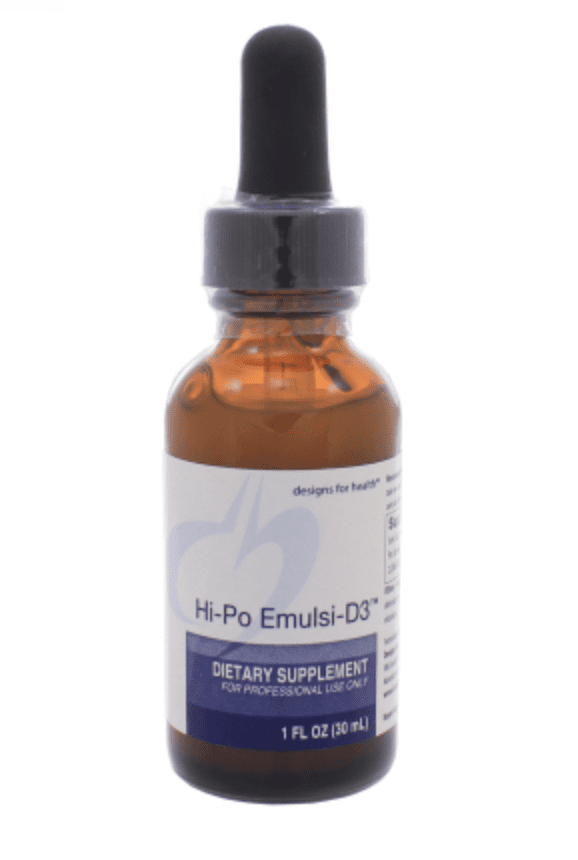
As you may have heard, Vitamin D is an excellent way to boost your immunity and help with a variety of different concerns. What you may not know is that Vitamin D deficiency is extremely prevalent in women diagnosed with PCOS – rates are as high as 67-85%! Not only that, research has linked Vitamin D deficiency to insulin resistance, showing an inverse relationship between Vitamin D levels and metabolic function.9
6.1 million young American women have difficulty achieving pregnancy. That’s 10% of reproductive-aged women in the United States! The cause of this is primarily ovulatory dysfunction, commonly seen in women with PCOS.
Research has found a direct relationship between Vitamin D levels and ovulation/live birth rates.10 Vitamin D levels below 20ng/mL are associated with lower ovulation rates and decreased success in ovulation, even with therapies.
In contrast, Vitamin D levels above 45ng/mL are associated with increased chances of live births. These results suggest that the optimal serum Vitamin D levels for women who are pregnant or trying to conceive fall above 45ng/mL.
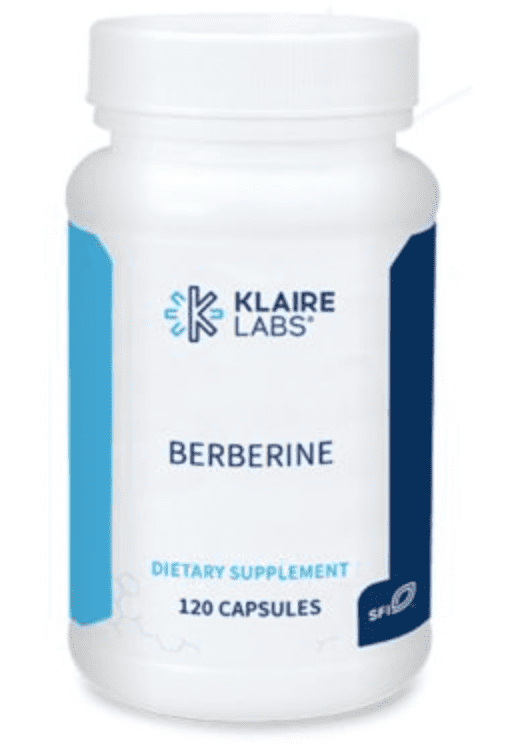
PCOS is now considered a type of metabolic syndrome, with 50-75% of diagnosed women displaying insulin resistance.
Berberine belongs to a class of naturally occurring alkaloids found in the roots, rhizomes, and stem bark of a number of plant species, and has been used for thousands of years in Chinese herbal medicines for treatment of diarrhea, metabolic syndrome, and infertility.
Research shows that in the treatment of insulin resistance, berberine has efficacy rates similar to that of metformin.11 In addition, berberine was found to reduce LH and testosterone production while increasing sex hormone-binding globulin (SHBG). This reduces bioavailable testosterone and related hyperandrogenic symptoms. These beneficial effects were not found with the use of metformin alone!
Studies with berberine in people with diabetes show that it exerts multiple beneficial effects on glucose and lipid metabolism. Naturally, derived berberine is provided as berberine hydrochloride, the best studied form.
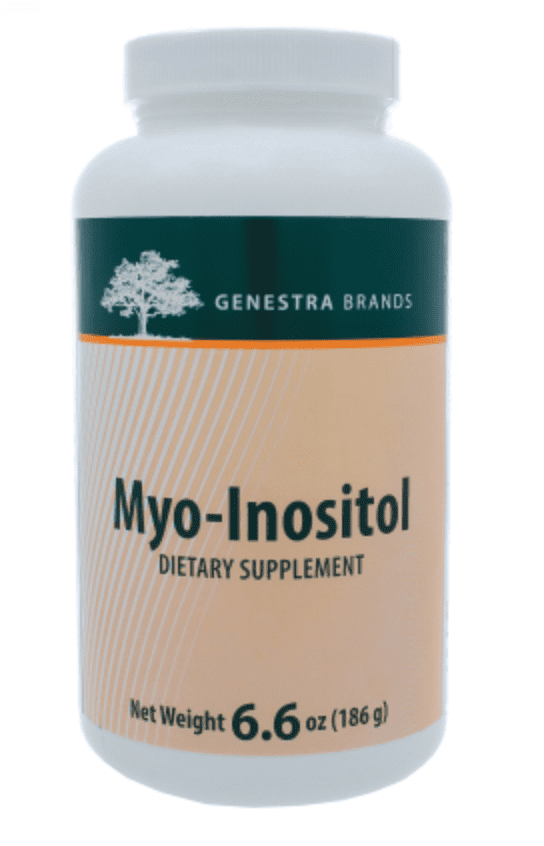
Myo-inositol is a naturally-occurring inositol isomer. It helps promote the activities of the ovaries through its role as a precursor to inositol 1, 4, 5-triphosphate (InsP3), which regulates menstrual cycle hormones and oocyte maturation.
Myo-inositol is the precursor to inositol triphosphate, a second messenger or intracellular signaling molecule released in response to the first messenger (usually hormones).
Inositol regulates thyroid-stimulating hormone (TSH), follicular stimulating hormone (FSH), and insulin.12 This means that inositol improves many different aspects of PCOS including thyroid function, fertility, and insulin sensitivity. Inositol acts to downregulate the release of free fatty acids, further improving insulin sensitivity and decreasing triglycerides (a form of cholesterol often seen elevated in PCOS).
By improving insulin sensitivity, inositol decreased stimulation of androgen production from the ovaries. Ultimately, this decreases bioavailable testosterone and improves hyperandrogenic symptoms.
In a clinical trial involving 42 women, participants were randomized to consume 400 mcg of folic acid alone or in combination with 4 g of myo-inositol daily for six to eight weeks. When compared to the placebo folic acid treatment, myo-inositol supplementation better promoted hormonal balance, menstrual regularity, and insulin sensitivity.
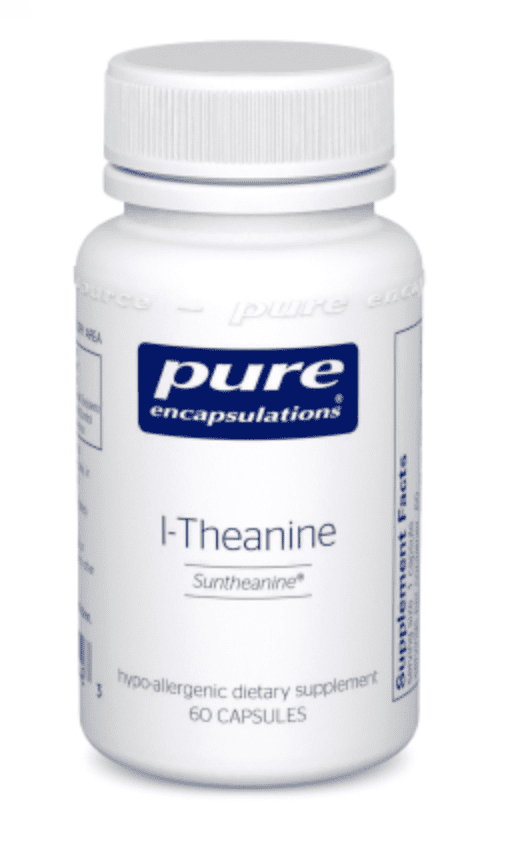
l-Theanine is an amino acid known for its calming effects and enhancement of cognitive ability.
After supplementation with 200mg of L-theanine, research has shown reduced stress responses for at least one hour and decreased cortisol production for up to 3 hours.13 Long-term anxiolytic effects have been recorded with daily doses of 400mg.
Green tea has been recognized for centuries as having relaxant properties. l-Theanine, a unique amino acid derived from tea, provides the characteristic taste of green tea. l-Theanine has also been discovered as the biologically active constituent of green tea responsible for promoting relaxation.
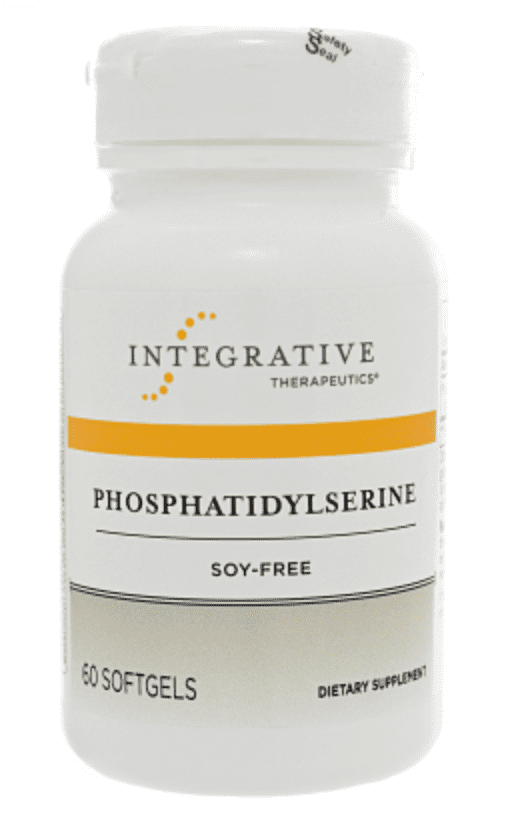
Phosphatidylserine is an important component of the cell wall, allowing for cellular signaling.
Supplementation helps to minimize the impact of acute and chronic stress on cortisol levels. While 400mg of phosphatidylserine per day can significantly decrease ACTH, the signal to release cortisol, 800mg daily is required to effectively lower cortisol levels.14,15
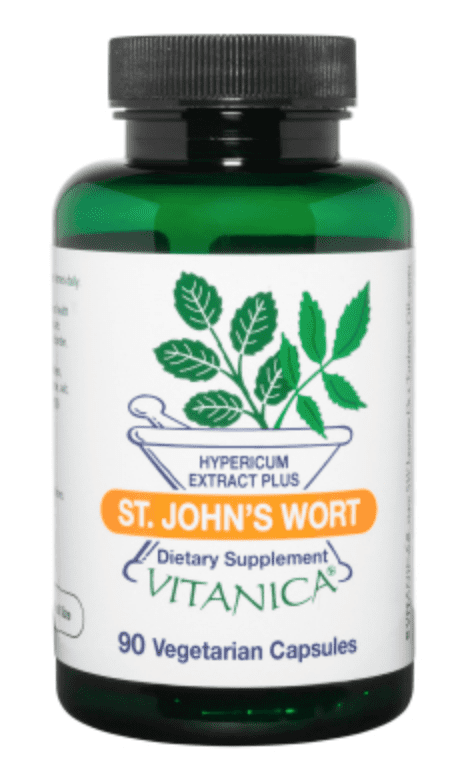
St. Johns Wort or Hypericum perforatum is an herb commonly used to treat mild to moderate depression, with efficacy and safety rates similar to that of antidepressants.
St. Johns’s wort extract has been shown to inhibit the reuptake of certain neurotransmitters, including serotonin, dopamine, norepinephrine, and glutamate. This increases synaptic excitability and decreases symptoms of depression.16
In addition, St. Johns Wort decreases stress-induced ACTH and cortisol production, making supplementation effective for anxiety reduction.17
Clinical studies with St. Johns Wort extract have demonstrated that this herb helps support normal psychological mood.
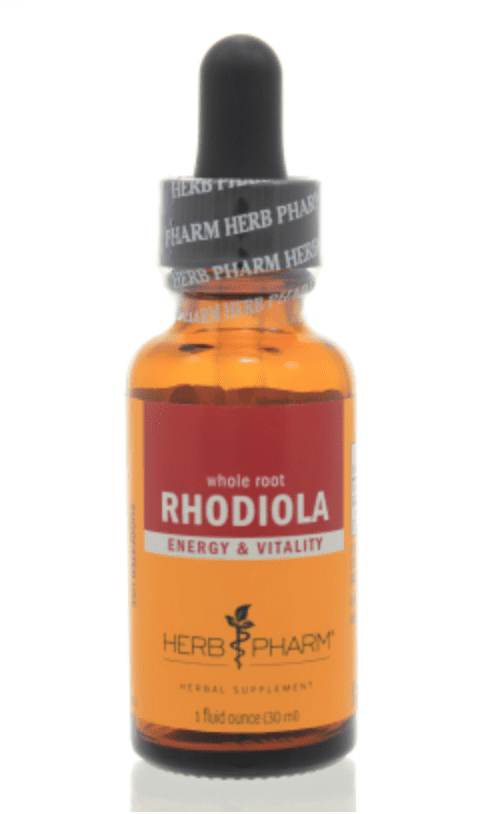
Rhodiola Rosea is an herb used to treat physical and mental fatigue.
Tumor necrosis factor alpha (TNF-a) is a marker frequently elevated in depressed individuals, and it is also shown to be reduced by supplementation of Rhodiola.18
Rhodiola provides anxiolytic effects through the improved regulation of the hypothalamic-pituitary-adrenal (HPA) axis, decreasing corticotropin-releasing hormone (CRH) and cortisone in rats.19 Basically, Rhodiola acts at the level of the brain to decrease signals for production of cortisol.
To assure optimal extraction of Rhodiola bioactive flavonoids and delicate rose flavor, the root is hand-harvested at its optimal potency and carefully shade-dried.
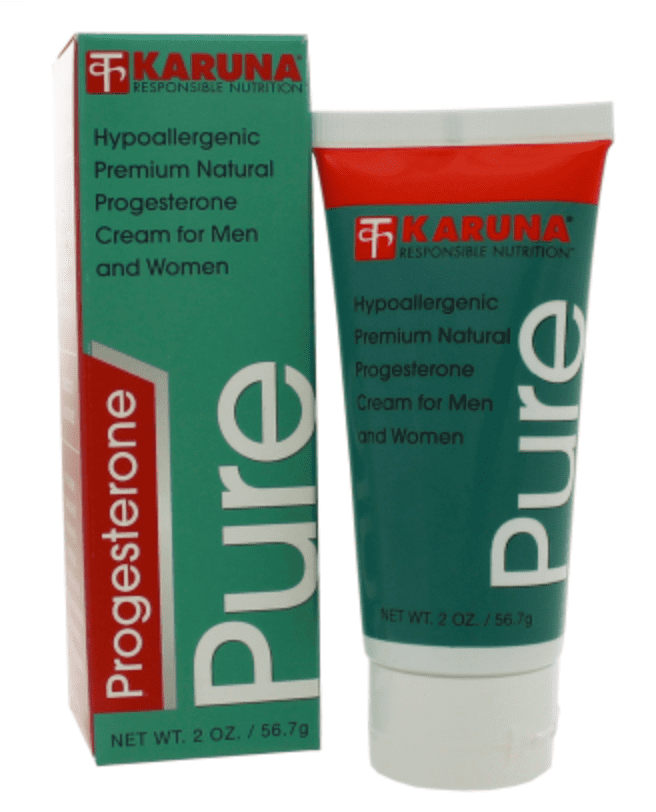
Progesterone, a sex hormone derived primarily from the corpus luteum in the uterus.
I find bio-identical progesterone therapy extremely effective for the treatment and management of women diagnosed with PCOS. Progesterone therapy helps to reduce androgen production, regulate menstrual cycles, and protect against the development of endometrial cancer.
Risk of endometrial cancer is elevated in women with estrogen dominance – commonly seen in PCOS – due to increased stimulation of endometrial growth. Progesterone acts to regulate estrogen-driven endometrial growth and shedding through menstrual cycles. This prevents endometrial pathologies and potential cancers.20
In addition, progesterone at high doses has been shown to inhibit 5-alpha reductase activity. That is the enzyme that supports the conversion of testosterone to DHT (which can cause hirsutism). Inhibiting this can improve symptoms of hirsutism like acne, facial hair growth, oily skin, and hair loss.21
Progesterone deficiency is commonly seen in women with PCOS and is a contributing factor to infertility. Why is that? Well, sufficient levels of progesterone are essential for implantation and during early pregnancy.
Oral progesterone administration has been shown to improve fertility rates and prevent pre-term births. Bio-identical progesterone is often utilized as a prescribed medication from a compounding pharmacy due to stricter regulation on dosages and increased absorbability. That said, progesterone is also sold as over-the-counter supplements.22
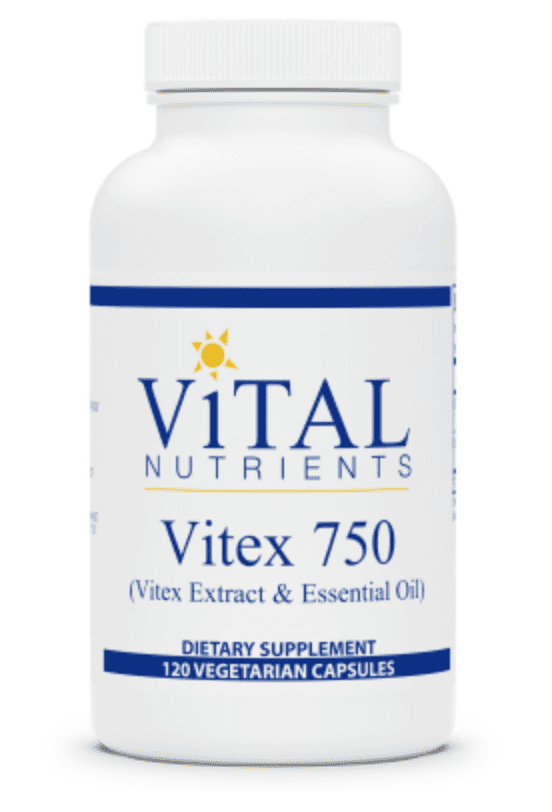
Chaste tree or Vitex agnus-castus is one of my all-time favorite treatments for women with PCOS. Vitex has been shown to improve fertility, mood, and menstrual regularity as well as decrease prolactin production.23
I frequently find elevation of prolactin levels in women diagnosed with PCOS. This causes symptoms like menstrual cycle irregularity, headaches, blurred vision, and elevation of ACTH, cortisol, and DHEA. Vitex lowers prolactin production through its action on the dopaminergic and opioid system in the brain.24
Vitex is a wonderful treatment for menstrual cramping and mood-related PMS symptoms. This is likely due to its inhibitory actions on the HPA axis and effects on the endogenous opioid system. Vitex works at the level of the brain to regulate and slow the pulsation of gonadotropin-releasing hormone (GnRH), improving menstrual regularity, ovulation, and fertility.
Vitex is excellent in supporting normal ovarian function, helping to maintain healthy hormone levels, and helping to promote healthy moods during the menstrual cycle.
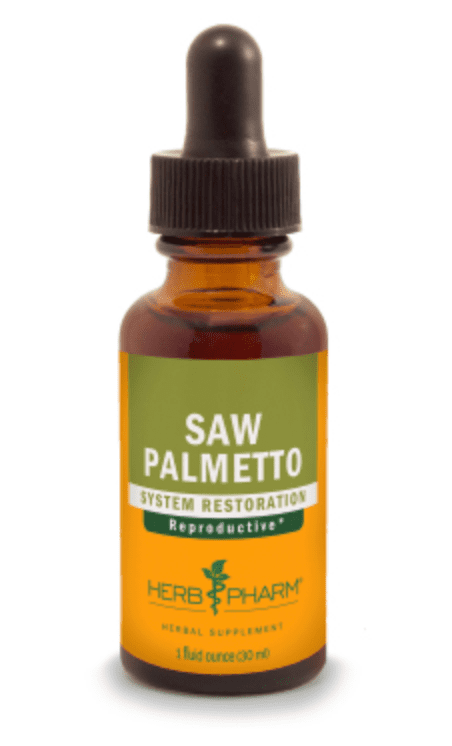
Saw Palmetto is a safe and effective supplement useful for controlling androgen excess.
Saw Palmetto or Serenoa repens is a naturally occurring 5-alpha reductase inhibitor frequently used to decrease symptoms of hyperandrogenism seen in PCOS.25 Symptoms are reduced due to the inhibitory effects on the conversion of testosterone to DHT. While more studies are needed to determine efficacy, doses of 160mg twice daily are generally recommended.
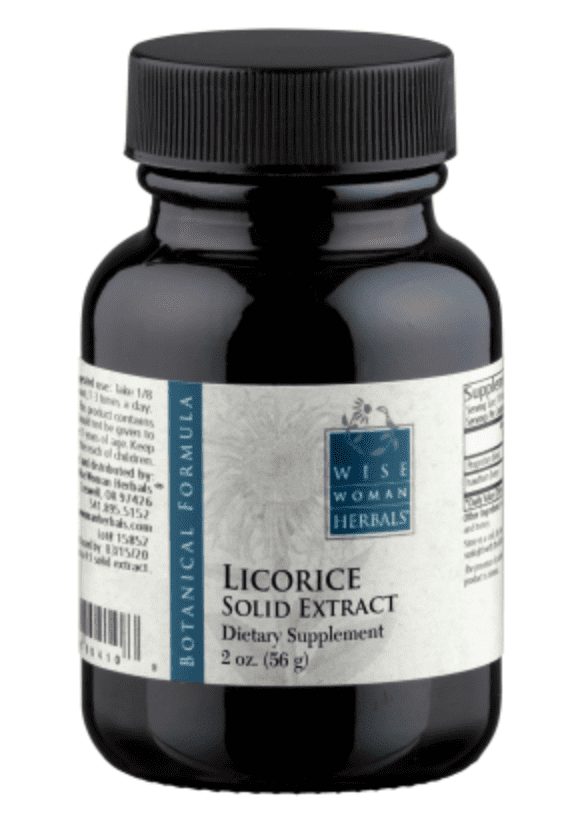
Glycerrhiza glabra or licorice root aids the treatment of arthritis, asthma, gastrointestinal ulcers, stress, irritable bowel syndrome, gout, eczema, and bronchitis.
Glycerrhiza glabra is also a wonderful treatment for elevated testosterone production and unwanted hyperandrogenic symptoms. Glycerrhiza has been shown to lower free and total testosterone in rats.
This effect is not seen in rats without ovaries, suggesting that glycerrhiza is acting at the level of the ovary to alter hormone production. It is believed that glycerrhiza increases the rate of aromatization (the conversion of testosterone to estrogen).26 This suggests that estrogen levels may rise as a result, elevating the importance of progesterone therapy to counteract the increase in estrogen.
You may be more familiar with it as licorice! The sweet flavor is extracted from the same plant to make the candy everyone knows and loves.
If you are one of the millions of women suffering from PCOS, just know that you aren’t alone. The good news is that there are ways to control and manage your symptoms, so the situation isn’t something you just have to accept at face value!
To help review how you can manage your PCOS symptoms, we discussed:
It is my hope that this article gives you the tools you need to change your life and alleviate even your most troubling PCOS symptoms. Be sure to discuss all treatments conventional or natural with a naturopathic doctor prior to beginning!
So many put their health on the back burner! Don’t let this be you!
Get started today! Sit down with your local naturopathic doctor, or schedule a consultation to be seen at Natural Med Doc to develop an individualized treatment plan based on your labs and specific needs.